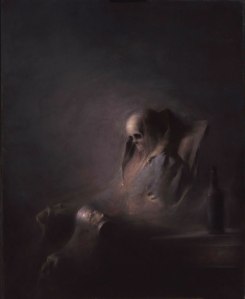Legendary Drama
M Gallery has recently received the first two new pieces in a series of narrative works from Chicago based painter Matthew Almy. Almy, a Florence Academy of Art graduate who founded the Ravenswood Atelier in 2007 with his wife Magda, has been working on the series of large scale religious literature themed works for several years. The initial offerings are some of the finest works we have ever seen here at M; incredibly complex subject matter presented with great skill and sensitivity.
Ravenswood Atelier, where Almy and his wife Magda work, occupies a second story cavernous space up on Lawrence Avenue in Chicago. It is drafty, dusty, has great north light and contains an astounding array of props, sets, student works, master works for teaching, plaster casts, models, palettes, easels, etc. The studios are a wonderland for art lovers. Almy is constructing props, skeletons, costumes – even spider webs – for his large scale works which are all painted from life. One has the sense of timelessness and urgency as the feverish pace that Almy works at is counterpoint to the spaciousness of the studio, the centuries old techniques he employs and the ancient subject matter on which he focuses his attention.
“I am primarily a figurative painter, but have retained a love for still lifes. With paint I can explore in depth objects that I find beautiful and intriguing. I get to create little moments by painting things I find all around the world, exploring the moods different light and compositions produce. I find that this greatly enriches my figure work; the two go hand in hand. I (paint) mostly large biblical narratives or narratives that are inspired by literature influenced by biblical themes. As a believer, these are of the most interest to me. They deal with very serious subjects that address all of humanity and our condition.” –Matthew Almy
David and Bathsheba, 50”x 40”, Oil on Belgian Linen
Bathsheba was the wife of Uriah the Hittite, and afterward of King David, by whom she gave birth to Solomon, who succeeded David as king. The story of David’s seduction of Bathsheba, is told in 2 Samuel 11. The story is told that David, while walking on the roof of his palace, saw Bathsheba, who was then the wife of Uriah, having a bath. He immediately desired her and later made her pregnant.
In an effort to conceal his sin, David summoned Uriah from the army (with whom he was on campaign) in the hope that Uriah would re-consummate his marriage and think that the child was his. Uriah was unwilling to violate the ancient kingdom rule applying to warriors in active service. Rather than go home to his own bed, he preferred to remain with the palace troops.
After repeated efforts to convince Uriah to have sex with Bathsheba, the king gave the order to his general, Joab, that Uriah should be placed in the front lines of the battle, where it was the most dangerous, and left to the hands of the enemy. After Uriah was dead, David made the now widowed Bathsheba his wife.
David’s action was displeasing to the Lord, who accordingly sent Nathan the prophet to reprove the king. After relating the parable of the rich man who took away the one little ewe lamb of his poor neighbor (II Samuel 12:1-6), and exciting the king’s anger against the unrighteous act, the prophet applied the case directly to David’s action with regard to Bathsheba.
The king at once confessed his sin and expressed sincere repentance. Bathsheba’s child by David was struck with a severe illness and died a few days after birth, which the king accepted as his punishment.
House of Mirth, 50”x 40”, Oil on Belgian Linen
Eccl. 7:2-4 “It is better to go to the house of mourning, than to go to the house of feasting: for that is the end of all men; and the living will lay it to his heart. 3 Sorrow is better than laughter: for by the sadness of the countenance the heart is made better. 4 The heart of the wise is in the house of mourning; but the heart of fools is in the house of mirth.”
To consider life in all its stages, ultimately and invariably culminating in death, gives us a healthy, balanced view of life. Just as a visit to the home of the poor helps us appreciate our wealth and a trip to the bed of the sick makes us appreciate our health, some time spent with the dead or grieving helps us appreciate life. This is not the easiest lesson to learn, but it is a necessary one. When we give sober thought to serious matters it brings good benefits later. “All discipline for the moment seems not to be joyful, but sorrowful; yet to those who have been trained by it, afterwards it yields the peaceful fruit of righteousness.” (Heb. 12:11) The fool is interested only in what is currently fair, pleasant, easy, diverting, amusing and fun. He gives no thought to serious things and so never acts seriously. But the wise considers all of life rationally, soberly and seriously. So he pays his respects to the dead and considers their life, his own life and his own death.
We are very excited about these two paintings. We feel they are historically important and represent all that is valuable in contemporary painting.



I’ve been to Matt’s studio and am absolutely in love with his work and his passion.
Hi Eric: I agree we are so thrilled to have his work…Maggie